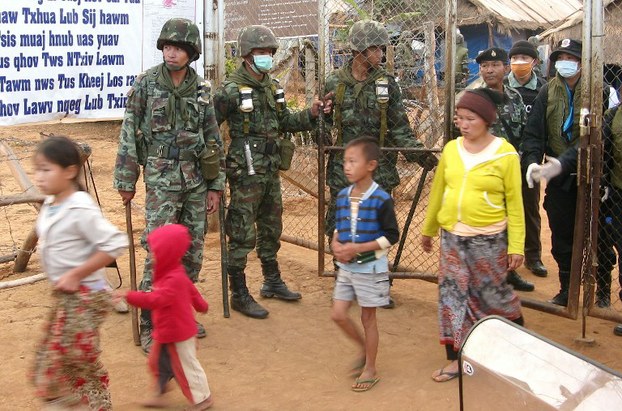Laos preparing charges against deported Hmong resistance leader
| Publisher | Radio Free Asia |
| Publication Date | 7 July 2014 |
| Cite as | Radio Free Asia, Laos preparing charges against deported Hmong resistance leader, 7 July 2014, available at: http://www.refworld.org/docid/53c8d9bdd.html [accessed 10 January 2017] |
| Disclaimer | This is not a UNHCR publication. UNHCR is not responsible for, nor does it necessarily endorse, its content. Any views expressed are solely those of the author or publisher and do not necessarily reflect those of UNHCR, the United Nations or its Member States. |
2014-07-07
 Thai soldiers stand guard during an operation to deport thousands of Hmong to Laos from a refugee camp in Huay Nam Khao in a file photo. AFP
Thai soldiers stand guard during an operation to deport thousands of Hmong to Laos from a refugee camp in Huay Nam Khao in a file photo. AFP
Lao authorities said Monday that they are investigating longstanding charges against a former ethnic minority Hmong resistance leader facing prosecution after being deported from neighboring Thailand.
A Lao security official, speaking on condition of anonymity, confirmed that Moua Toua Ter was deported home on June 23 from Thailand and that he was "under investigation" for charges Lao authorities had leveled against him many years ago.
He did not provide further details, including the nature of the charges.
Moua was among Hmongs who had fought for the United States, alongside American troops, during the Vietnam War.
He had been on the run in the jungles of Laos for more than two decades before sheltering in Thailand for eight years while seeking resettlement in a third country.
Officials from Thailand's Immigration Police told The Associated Press last week that Moua was deported after being held in Bangkok since March last year.
Rights groups had raised concerns that he will face persecution in his homeland.
Conviction
AP said that Moua Toua Ter's case was complicated by a manslaughter conviction in Thailand, after he shot dead a Laotian woman in what he claimed was self-defense.
His supporters said the woman was a Laotian government agent sent to lure him back to Laos, according to the report, which said that several opponents of the communist regime in Laos had been killed under mysterious circumstances in Thailand or disappeared on visits to their homeland.
Moua served his sentence in the northern Thai province of Tak until March last year, after which he was transferred to the immigration jail in Bangkok.
The Thai immigration officer who spoke to AP from Nong Khai said that Moua, like others who illegally enter Thailand, was "repatriated through the natural border," meaning he was sent on a boat across the Mekong River marking the nations' boundary.
Facing persecution
Lao authorities have long been wary of opposition among the Hmong, many of whom say they face persecution from the government because of their Vietnam War-era ties with the United States.
Thousands of Hmong fought under CIA advisers during a so-called "secret war" against communists in Laos.
General Vang Pao, who spearheaded the 15-year CIA-sponsored war, died in the United States in 2011 at the age of 81.
The outspoken opponent of the Lao government immigrated to the United States after the communists seized power in his country in 1975.
Reported by RFA's Lao Service. Written in English by Di Hoa Le.
Link to original story on RFA website

 Refworld Case Law Collection Survey
Refworld Case Law Collection Survey